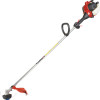RedMax BC280 Owners Manual - Page 5
Stop switch, Cutting attachment guard
 |
View all RedMax BC280 manuals
Add to My Manuals
Save this manual to your list of manuals |
Page 5 highlights
SAFETY INSTRUCTIONS Make sure the throttle control is locked at the idle setting when the throttle lock--out is released. Stop switch Make sure the engine stops when you push and hold the stop switch. Press the throttle lock--out and make sure it returns to its original position when you release it. Cutting attachment guard Check that the throttle control and throttle lock--out move freely and that the return springs work properly. This guard is intended to prevent loose objects from being thrown towards the operator. The guard also protects the operator from accidental contact with the cutting attachment. See instructions under the heading Start. Start the machine and apply full throttle. Release the throttle and check that the cutting attachment stops and remains at a standstill. If the cutting attachment rotates with the throttle in the idle position then the carburettor idle setting must be checked. See instructions under the heading Maintenance. Check that the guard is undamaged and not cracked. Replace the guard if it has been exposed to impact or is cracked. Always use the recommended guard for the cutting attachment you are using. See the "Technical data" section. WARNING: Never use a cutting attachment without an approved guard. See the section on "Technical data". If an incorrect or faulty guard is fitted this can cause serious personal injury. Use of incorrectly wound trimmer line or an incorrect cutting attachment increases the level of vibration. WARNING: Overexposure to vibration can lead to circulatory damage or nerve damage in people who have impaired circulation. Contact your doctor if you experience symptoms of overexposure to vibration. Such symptoms include numbness, loss of feeling, tingling, pricking, pain, loss of strength, changes in skin color or condition. These symptoms normally appear in the fingers, hands or wrists. The risk increases at low temperatures. 115391527 Rev. 4 5/15/12 English--- 5














